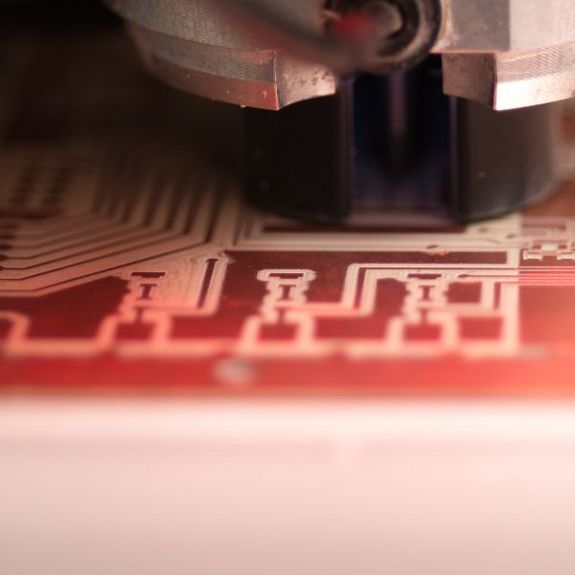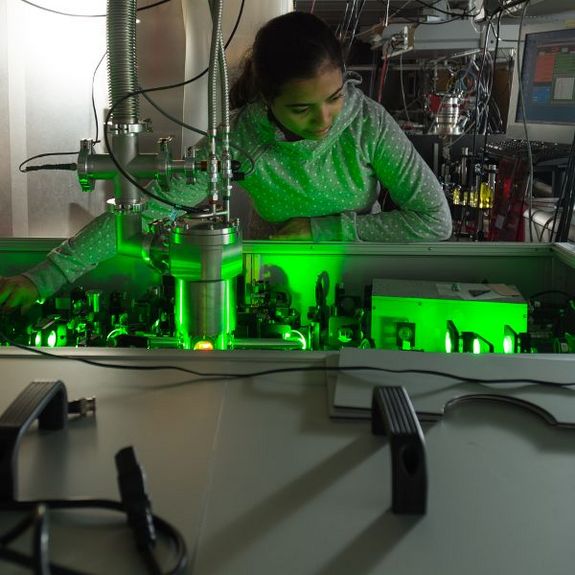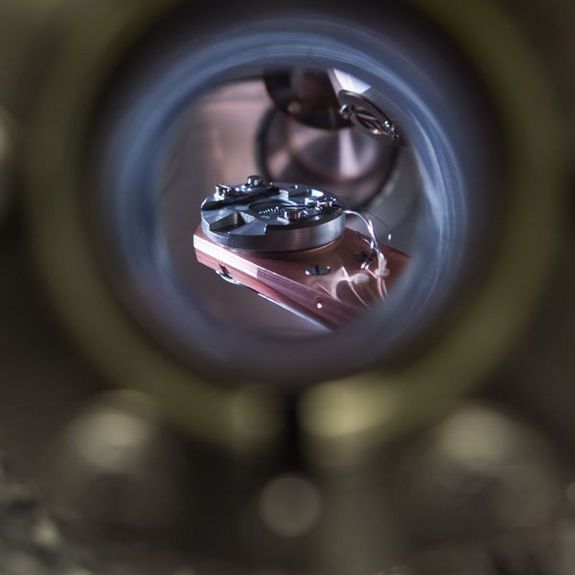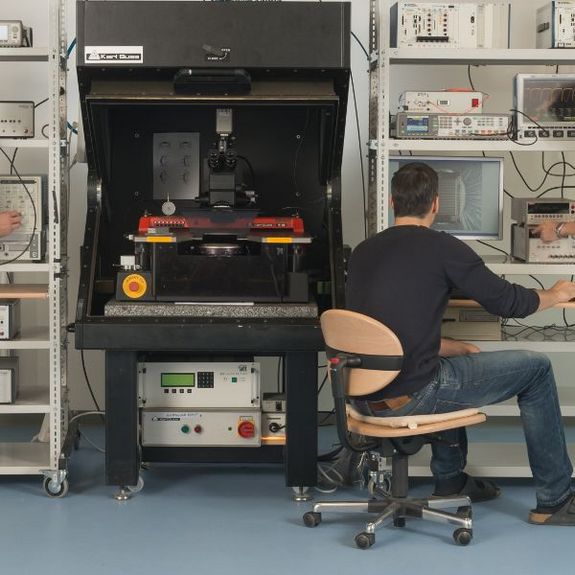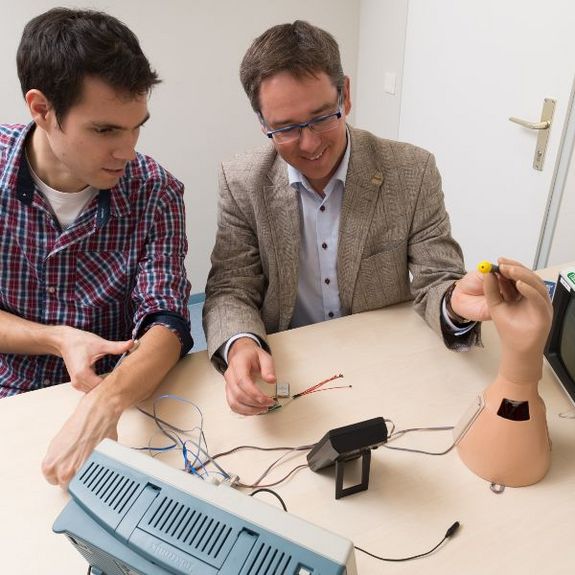
Bachelor's Programme Electrical Engineering and Information Technology
- Programme Code
-
UE 033 235 - Bachelor's Programme Electrical Engineering and Information Technology
- Duration of Programme
-
6 semesters
- Credits
-
180 ECTS
- Language
-
German
- Degree
-
Bachelor of Science (BSc)
- Curriculum
Programme contents
The Bachelor's Programme Electrical Engineering and Information Technology deals with technologies based on electrical energy. These can be found in almost all areas of daily life: Smarpthones, computers, cars, household appliances, robots, smart homes, medical devices, public transportation and the entire power supply are based on electrical engineering.
In the programme, you will learn the technical fundamentals to understand and research these topics. Special attention is also paid to sustainable energy sources and the development of new technologies for the energy- and resource-saving production of electrotechnical components. Graduates find careers in various fields such as industry and business, consulting, public administration, transportation companies, energy suppliers and many more.
Programme-PRe-Phase
There is no Admission Procedure for the Bachelor's Programme Electrical Engineering and Information Technology. Instead, before admission, you must familiarize yourself with the contents of the programme in the so-called study preparation and reflection phase.
After an online survey on your choice of study, you will receive feedback on your level of knowledge in mathematics.
You can find all information about the Programme-PRe-Phase in the Bachelor's Programme Electrical Engineering and Information Technology on the page with the same name.
Further information about the programme
If you are interested in this Bachelor's Programme, you should be curious and eager to learn. It is also an advantage if mathematics excites you: In electrical engineering, many scientific theories are presented with the help of mathematics.
For first-year students, there is a course to learn how to use measuring instruments and an alignment course in mathematics so that everyone has the same prerequisites. You will learn programming during the course of your studies.
Besides a basic technical understanding, the ability to "turn corners" is definitely an advantage.
Apart from the formal conditions for admission, you do not have to meet any other requirements. You must register online in the campus software TISS, opens an external URL in a new window to participate in the Programme-PRe-Phase.
The admission takes place in the admission office of the TU Wien.
If you have any questions about your programme, you can contact the Student Union, opens an external URL in a new window and the Dean's Office of the Faculty of Electrical Engineering and Information Technology.
The contents of the Programme are divided into different modules. A module consists of individual courses or courses with related content. You must complete these in order to complete the module. Thematically similar modules are combined into examination subjects. These examination subjects appear on the degree certificate with the overall grade achieved upon completion of the programme.
The scope of courses and modules is expressed in ECTS points. One ECTS point represents 25 hours of work.
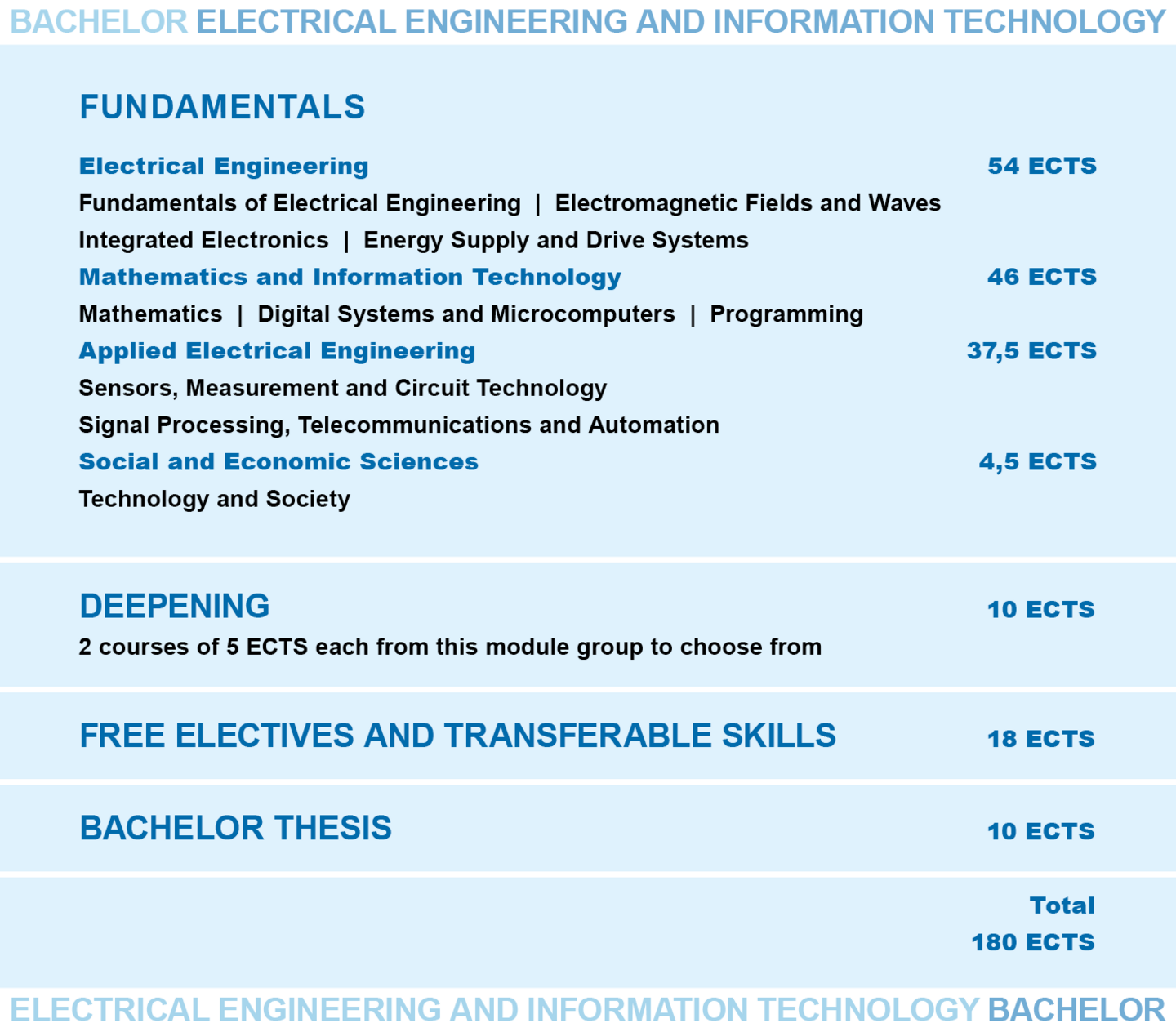
The Bachelor's Programme Electrical Engineering and Information Technology is composed of the following examination subjects and modules.
The mandatory foundation modules are:
- Electrical Engineering: Fundamentals of Electrical Engineering, Theoretical Electrical Engineering, measurement and Circuit Design, Microelectronics and Photoncs, Sensors and Automation as well as Energy Systems and Electrical Drives 3
- Mathematics and Information Technology: Mathematics Basics, Information Processing, Mathematics Deepening, Microcomputer, Programming, Communications Engineering
- Natural Sciences: Physics for Electrical Engineering, Electrical Engineering Materials
- Social and Economic Sciences: Communication and Economy as well as Technology and Management
In addition, you must complete 18 ECTS from a catalog of Free Electives and Transferable Skills.
Finally, you have to write your Bachelor's thesis.
More detailed information can be found in the curriculum in TISS, opens an external URL in a new window.
In the Bachelor's Programme Electrical Engineering and Information Technology most of the courses are mandatory. From the important areas such as mathematics, electrical engineering, programming, measurement and circuit technology, you will learn the basic load. In the subject diversification, you can get an insight into the main research areas, which will also help you to choose a Master's Programme.
From a pool of electives as well as free electives, you can also choose courses that match your interests.
Almost every technical product contains electrical engineering. Smartphones contain many different sensors, and radio transmissions such as WiFi, 5G and NFC are based on electrical components. Modern vehicles also function through the interaction of many electrotechnical components.
In this context, the improvement of systems for energy generation and the optimization of various processes help to produce and transport all these components in a more energy-saving way.
This can be continued indefinitely: Robots provide support in the home and in everyday life, biomedical technology is used in smart prostheses, assistance systems are used in vehicles to enable semi-autonomous driving. Electrical engineering is needed for smart homes, for medical and analytical devices, electromobility, regenerative energy systems, high-power lasers, semiconductor technology and much more.
After the Bachelor's Programme in Electrical Engineering and Information Technology, it is possible to start a career in numerous technical professions. However, the Bachelor's Programme covers a very broad area. We therefore recommend that you specialize in one of the Master's Programmes.
The job opportunities are very good and you have many different possibilities in industry and commerce, consulting, public administration, transport companies, energy providers and many more.
Companies often approach prospective graduates directly. Of course, a career in research and academia is also possible.
Electrical engineering plays an important role in almost all areas of life. The current research topics are correspondingly varied.
In human-machine interaction and the field of robotics, for example, we are researching the development of so-called co-bots. These are robots that work directly with humans and support them. Another major topic is autonomous, independent operation of robotic systems, such as semi-autonomous driving or systems that support the operation of construction machinery.
In the energy transition, the expansion of photovoltaics and wind energy presents us with major challenges: Smart grids, i.e. intelligent electrical energy networks, are becoming increasingly complex and research into the design to ensure stability is becoming more and more important.
We are working on research into smaller electronic and photonic devices and the use of quantum effects in these devices. In the process, we are also investigating new materials such as graphene and other flat materials to exploit their unique properties in electronics and optics.
TU Wien offers its students the opportunity to spend a semester abroad. During the Bachelor's Programme there are certain requirements for this, which can be found on the faculty homepage at https://www.tuwien.at/en/etit/etit-student-services and on the International Office website.
Internships are not mandatory. However, they help to better understand and consolidate what has been learned and support career orientation.
In the Bachelor's Programme Electrical Engineering and Information Technology there are enough teaching staff for the students to guarantee a good supervision ratio. There is no limit to the number of study places.
In the Bachelor's Programme Electrical Engineering and Information Technology you will spend most of your time at the main location of the Faculty of Electrical Engineering and Information Technology at the Campus Gußhaus, opens an external URL in a new window in Gußhausstraße 27-29.
The programme is supervised by the following institutes:
- Institute of Electrodynamics, Microwave and Circuit Engineering
- Institute for Microelectronics
- Institute of Solid State Electronics
- Institute of Biomedical Electronics
- Institute of Sensor and Actuator Systems
- Institute of Energy Systems and Electrical Drives
- Institute of Automation and Control
- Institute of Computer Technology
- Institute of Photonics
- Institute of Telecommunications
After you have completed all required courses and your Bachelor's thesis has been evaluated, you can submit your degree.
As a graduate of the Bachelor's Programme Electrical Engineering and Information Technology, you will be awarded the academic degree "Bachelor of Science" - BSc for short. To find out how to graduate, visit https://www.tuwien.at/en/etit/etit-student-services.
At TU Wien, you can choose one of the following Master's Programmes for specialization after completing your Bachelor's Programme Electrical Engineering and Information Technology:
- Master's Programme Electrical Power Engineering and Sustainable Energy Systems
- Master's Programme Embedded Systems
- Master's Programme Telecommunications
- Master's Programme Microelectronics and Photonics
- Master's Programme Automation and Robotic Systems
Furthermore, you can choose from the following interdisciplinary Master's Programmes:

